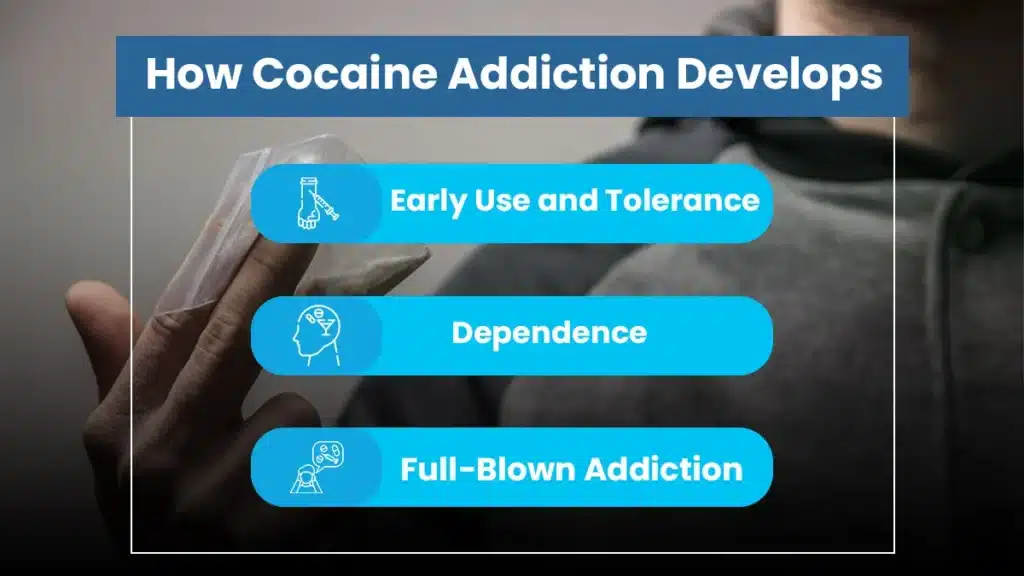Cocaine, a powerful stimulant derived from the coca plant, is a highly addictive drug. Its immediate effects include a surge of energy and euphoria. However, these highs are short-lived, leading individuals to seek repeated doses to sustain the sensations, which ultimately results in addiction.
This article delves into the science behind cocaine addiction, explaining how the drug alters brain chemistry and leads to compulsive drug-seeking behaviors. It will also explore available treatment options to help individuals struggling with cocaine addiction regain control of their lives.
Key Takeaways
Cocaine, derived from the coca plant, is a central nervous system stimulant drug. Here is what you need to know about this illegal drug:
- Cocaine disrupts dopamine pathways in the brain, fueling addiction by hijacking the brain’s reward system.
- Cocaine addiction can have various signs and symptoms that manifest physically, psychologically, and behaviorally.
- Overcoming cocaine addiction is possible as various effective treatments are available, such as inpatient rehab.
Contact The Haven Detox-South Florida at (561) 328-8627 to initiate a transformative journey toward recovery from substance use disorder (SUD).
Inside the Brain: Science of Cocaine Addiction
Understanding the science behind cocaine addiction involves examining how the drug influences the brain and, in particular, the role of dopamine in the addiction process.
How Cocaine Affects the Brain
Cocaine, one of the addictive substances, swiftly alters the brain’s normal functioning. It disrupts the brain’s communication system upon use, particularly affecting neurotransmitters like dopamine. This disruption leads to high levels of dopamine, causing intense feelings of pleasure and energy. The brain becomes flooded with this chemical messenger, creating a euphoric high.
Role of Dopamine in Addiction
Dopamine plays a crucial role in addiction. It regulates pleasure and reward centers in the brain. With regular cocaine use, the brain’s reward system gets hijacked. The drug artificially increases dopamine levels, creating an overwhelming sense of pleasure. Over time, the brain adapts to this excess dopamine by reducing its natural production, which contributes to the cycle of addiction.
How Cocaine Addiction Develops

Developing a cocaine addiction involves several stages, starting with early use and progressing toward tolerance, physical dependence, and full-blown addiction.
Early Use and Tolerance
Initially, when someone starts using cocaine, they might experience a heightened sense of energy and euphoria. However, as the body becomes adapted to the drug’s presence, tolerance develops. Tolerance means the individual needs large doses of cocaine to achieve the same pleasurable effects they initially felt with smaller amounts.
Dependence
With continued use, the body becomes dependent on cocaine to function normally. The brain’s reward system becomes rewired, associating cocaine use with pleasure and making it difficult to feel pleasure from other activities or substances. This dependency fuels the cycle of craving and using cocaine, even as negative consequences mount.
Full-Blown Addiction
Full-blown addiction emerges when the user becomes unable to control their cocaine use despite knowing the adverse effects it brings. They prioritize obtaining and using the drug over other aspects of life, such as relationships, work, or health. Cocaine addiction can lead to severe consequences, including financial issues, serious health problems, and strained relationships.
Identifying Cocaine Addiction: Signs and Symptoms
Cocaine addiction can have various signs and symptoms that manifest physically, psychologically, and behaviorally. Here is the breakdown of each category:
Physical Signs
Physical symptoms of cocaine dependence often include:
- Increased Energy: Cocaine often causes a burst of energy and hyperactivity in individuals.
- Dilated Pupils: The drug can cause pupils to appear larger than normal.
- Changes in Appetite: Long-term cocaine use can suppress appetite, leading to weight loss.
- Sleep Disturbances: Insomnia or irregular sleep patterns might develop.
- Nasal Issues: Frequent snorting of cocaine can lead to nasal congestion, nosebleeds, or damage to the nasal septum.
- Tremors or Shaking: In some cases, individuals might exhibit trembling or shaky movements.
Psychological Signs
Psychological signs of cocaine use disorder encompass:
- Increased Euphoria: Cocaine triggers feelings of intense pleasure or euphoria.
- Anxiety and Paranoia: Heightened anxiety levels, paranoia, or panic attacks.
- Mood Swings: Rapid and unpredictable shifts in mood, from euphoria to irritability or depression.
- Agitation: Restlessness, irritability, or agitation, especially during withdrawal or craving periods.
- Confusion or Disorientation: Difficulty in concentrating or staying focused.
- Hallucinations: Sensing things that aren’t there, either visually or audibly.
Behavioral Signs
Behavioral signs of cocaine dependence involve:
- Secretive Behavior: Attempting to conceal drug use or being evasive about whereabouts.
- Financial Issues: Rapidly spending money without explanation or running into financial problems.
- Neglecting Responsibilities: Neglecting work, school, or family obligations due to drug use.
- Increased Risk-Taking: Engaging in risky behaviors, such as unsafe sex or reckless driving.
- Social Isolation: Withdrawing from friends, family, or social activities.
Remember, these signs and symptoms of cocaine addiction can vary in severity from person to person. If you or your family member is exhibiting these signs, seeking professional help from a healthcare provider or addiction specialist is vital for proper assessment and support.
The Toll of Cocaine Addiction
Cocaine abuse and addiction can have severe health consequences. Here are some of the risks associated with short- and long-term use of cocaine:
Side Effects and Risks
Cocaine use can trigger a range of serious side effects and risks. In the short term, cocaine use can lead to high blood pressure, irregular heart rate, and constricted blood vessels. This can result in heart attack, stroke, or seizures, especially with prolonged or high-dose usage. Long-term effects of cocaine use may include severe damage to the respiratory system, leading to breathing difficulties and chronic coughing.
Furthermore, repeated use of cocaine can profoundly impact mental health, contributing to anxiety, paranoia, and depression. Individuals might also experience disturbances in sleep patterns, appetite changes, and even severe mood swings. Injecting cocaine, in particular, brings the added risks of infectious diseases through shared needles, like HIV/AIDS or hepatitis.
Withdrawal and Overdose
Quitting cocaine after long-term regular use can lead to intense withdrawal symptoms. These may include depression, fatigue, anxiety, strong cravings, and disturbed sleep. While withdrawal is not typically life-threatening, it can be exceptionally challenging and may lead individuals to relapse without proper support.
In addition, there is a risk of cocaine overdose. Overdosing on cocaine can cause seizures, cardiac arrest, strokes, and even sudden death. Recognizing the signs of drug overdose, such as chest pain, extreme anxiety, confusion, or seizures, and seeking immediate medical assistance is crucial in potentially saving a life.
Recovery From Cocaine Addiction: Treatment Options
Recovery from cocaine addiction often involves a comprehensive approach that addresses both the physical and psychological aspects of the addiction. Here’s an overview of the key components of the cocaine addiction treatment program:
Medical Detoxification
Medical detoxification, often the first step in recovery, involves supervised withdrawal from cocaine in a controlled setting. Medical professionals help manage withdrawal symptoms, ensuring the process is as safe and comfortable as possible.
Rehabilitation Programs
Rehabilitation programs offer structured environments to support recovery. Inpatient programs provide immersive, 24/7 care and therapy, ideal for severe substance abuse issues. Outpatient programs allow individuals to receive treatment while maintaining daily responsibilities like work or school.
Therapy and Counseling
Therapy and counseling play pivotal roles in addressing the psychological aspects of addiction. Cognitive-behavioral therapy (CBT), motivational interviewing (MI), individual or group counseling, and family therapy help individuals understand triggers and underlying mental health issues, develop coping strategies, and navigate life without drugs, such as cocaine, alcohol, heroin, and crystal meth.
Medication-Assisted Treatment (MAT)
For some, medication-assisted treatment (MAT) may be recommended. MAT involves the use of medications, combined with counseling and therapy, to address drug addiction. MAT medications help manage cravings and withdrawal symptoms, enhancing the chances of successful recovery.
Support Groups
Local support groups, such as Narcotics Anonymous (NA) or Cocaine Anonymous (CA), offer a community of individuals navigating similar challenges. These groups provide encouragement, guidance, and a sense of belonging, promoting ongoing sobriety and emotional support.
Frequently Asked Questions (FAQ)
What makes cocaine so addictive?
Cocaine is highly addictive due to its impact on dopamine levels in the brain, creating intense feelings of pleasure. Its rapid and short-lived effects often lead to a cycle of repeated drug abuse.
Can a first-time cocaine user become addicted?
While addiction risks vary, even first-time cocaine use can trigger intense cravings. The drug’s powerful effects on dopamine may lead to rapid addiction in susceptible individuals.
Can cocaine addiction be easily recovered?
Cocaine addiction recovery can be challenging due to its impact on the brain’s reward system. However, with comprehensive treatment and support, many individuals recover over time.
The Haven Detox-South Florida: Where Healing Begins
At The Haven Detox-South Florida, we’re here to make recovery happen.
Begin your transformation with our medical detox program, carefully designed to cleanse your body of toxins and prepare you for further treatment. Our 24/7 residential care combines medication, behavioral therapies, IV therapy, and holistic approaches, offering a holistic approach for a well-rounded recovery.
We understand that mental health is a vital aspect of your journey. Therefore, our dedicated team provides mental health treatment for issues like anxiety and depression, ensuring a comprehensive healing process.
Take that first step toward a better, healthier future today. Contact us at (561) 328-8627, and let’s walk this path together.








